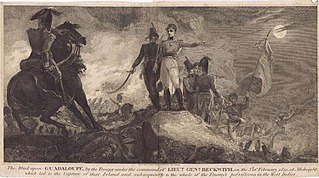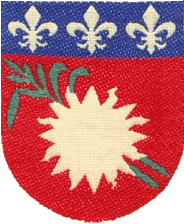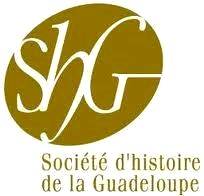 W
WThe Action of 22 January 1809 was a minor naval engagement fought off the Caribbean island of Guadeloupe during the Napoleonic Wars. The action was fought as part of the blockade of Guadeloupe and neighbouring Martinique by a large British Royal Navy squadron, which was seeking to cut the islands off from contact and supplies from France by preventing the passage of shipping from Europe to the islands. The British blockade was part of their preparation for planned invasions during the next year.
 W
WAffranchi is a former French legal term denoting a freedman or emancipated slave, but was a term used to refer pejoratively to mulattoes. It is used in the English language to describe the social class of freedmen in Saint-Domingue, and other slave-holding French territories, who held legal rights intermediate between those of free whites and enslaved Africans. In Saint-Domingue, roughly half of the affranchis were gens de couleur libres and the other half African slaves.
 W
WVictor Collot, in full Georges Henri Victor Collot was a French military officer who served in the New World in various capacities, among them as Governor of Guadeloupe.
 W
WLouis Delgrès was a leader of the movement in Guadeloupe resisting reoccupation by Napoleonic France in 1802.
 W
WAdolphe Sylvestre Félix Éboué was a French colonial administrator and Free French leader. He was the first black French man appointed to a high post in the French colonies, when appointed as Governor of Guadeloupe in 1936.
 W
WThe governors general of the French Antilles, or lieutenants-general, were the king's representatives in the French West Indies colonies under the Ancien Régime. The colonies were, by date of foundation, Saint-Christophe (1625), Saint-Domingue (1627), Saint Martin (1635), Martinique (1635), Guadeloupe (1635), Dominica (1635), Saint Barthélemy (1648), Grenada (1650), Saint Croix (1650), Saint Lucia (1660), Tobago (1678), the Grenadines and Saint Vincent (1699).
 W
WThe Guadeloupe Conference was a meeting held by four Western powers; the United States, the United Kingdom, France and West Germany in Guadeloupe Island from 4 to 7 January 1979. Discussions focused on various world issues, especially the Middle East and the Iranian political crisis.
 W
WThe British expedition against Guadeloupe was a military action from January to May 1759, as part of the Seven Years' War. A large British force had arrived in the West Indies, intending to seize French possessions. After a six-month-long battle to capture Guadeloupe they finally received the formal surrender of the island, just days before a large French relief force arrived under Admiral Maximin de Bompart.
 W
WThe Invasion of Guadeloupe was a British amphibious operation fought between 28 January and 6 February 1810 over control of the Caribbean island of Guadeloupe during the Napoleonic Wars. The island was the final remaining French colony in the Americas, following the systematic invasion and capture of the others during 1809 by British forces. During the Napoleonic Wars, the French colonies had provided protected harbours for French privateers and warships, which could prey on the numerous British trade routes in the Caribbean and then return to the colonies before British warships could react. In response, the British instituted a blockade of the islands, stationing ships off every port and seizing any vessel that tried to enter or leave. With trade and communication made dangerous by the British blockade squadrons, the economies and morale of the French colonies began to collapse, and in the summer of 1808 desperate messages were sent to France requesting help.
 W
WThe Invasion of Guadeloupe was the last conflict between French and British forces during the Napoleonic Wars, and took place after Napoleon's defeat at Waterloo.
 W
WJean-Paul Proust was a French and Monegasque civil servant. He served as the Minister of State of Monaco.
 W
WScouting is active on Guadeloupe and on Saint Martin, connected administratively in the Territoire de Guadeloupe et Saint Martin of the Scouts et Guides de France. The Scouts of the islands participate in many Caribbean regional Scout camps, jamborees and other Scout activities. Scouting closely follows the program of the Scouts et Guides de France. The Scouts et Guides de Saint Martin and the Scouts et Guides de Guadeloupe are subsections of the larger regional entity.
 W
WThe Societe d'Histoire de la Guadeloupe is a French society for the study of the history of Guadeloupe, the French Antilles and the wider Caribbean basin. It was founded in 1963 and publishes a scholarly journal titled Bulletin de la Société d'Histoire de la Guadeloupe.